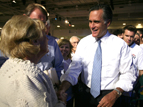The Very First Mormon Presidential Candidate

While it may have sounded like a stretch when then-Republican Party nominee George Bush named Christ as his favorite political philosopher without explaining what sort of ideas Jesus offered about governance and public policy, former Massachusetts Governor Mitt Romney could hark back with complete authenticity to the political philosophy of Joseph Smith — indeed, Mormonism is the only world religion whose founder ran for U.S. Ppresident.

For one thing, Smith’s five-month-long, second-tier run for the presidency in 1844 (which ended when Smith was assassinated in June of that year) bore the hallmark of the mini-Mormon civilization Smith had created at that time in Nauvoo, Ill. — it blurred the boundaries of church and state.
Just so, Smith’s campaign was a cross between political and spiritual evangelism. Three months after he declared his candidacy, he called for volunteer “electioneers” to campaign for him, and more than 340 stepped up the challenge. “Campaigning seemed secondary in comparison to the amount of time they spent preaching,” writes former BYU undergrad Margaret C. Robertson, who surveyed and analyzed the electioneer’s journals.

More controversial than his specific policy proposals, however, was Smith’s call for “theodemocracy,” a kind of national political system that would — like the Mormon settlement at Nauvoo — blend theocracy and democracy. Said Smith in April, 1844: “There is not a nation or a dynasty now occupying the earth which acknowledges Almighty God as their lawgiver.”
Smith’s religio-political vision was not an easy sell: his electioneers, who depended on the charity of others for their own sustenance, faced not only “hunger, fatigue and illness” on the campaign trail, but also bodily threats; some electioneers recorded being pelted with tobacco, whipped or even tarred and feathered, according to Robertson. And of course Smith himself died at the hands of an anti-Mormon mob that stormed his prison cell, where he was kept after being accused of treason for destroying a rival’s printing press.
Does Romney, in his private moments, find inspiration in Smith’s ill-fated candidacy? At the very least, he can take comfort in the fact that he has not yet been tarred and feathered.

Pingback by Why Romney’s Task Is Very Different From JFK’s | Religion Writer.com on 4 December 2007:
[…] The very first Mormon presidential candidate, of course, was the founding prophet of the LDS church, Joseph Smith. Were Smith’s political […]